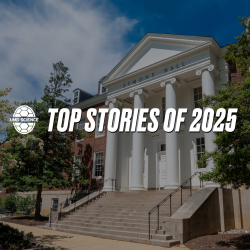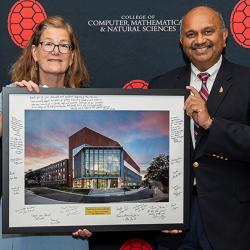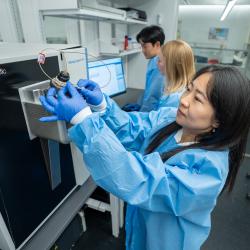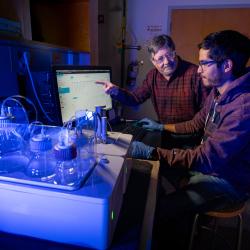Chemistry & Biochemistry’s Lai-Xi Wang Named Distinguished University Professor
University of Maryland Chemistry and Biochemistry Professor Lai-Xi Wang has been named Distinguished University Professor—the highest academic honor bestowed by the university. He will be honored at the university’s annual Faculty and Staff Convocation on September 13, 2023.
"We are privileged to have Lai-Xi here at the University of Maryland," said Amitabh Varshney, dean of UMD’s College of Computer, Mathematical, and Natural Sciences (CMNS). "His contributions to the field of biochemistry are exceptional, and being named Distinguished University Professor honors those achievements in addition to his outstanding classroom teaching, entrepreneurship and record of service, both on campus and internationally."

Wang joins 60 faculty members in CMNS who have been named Distinguished University Professors since 1980. Distinguished University Professors are faculty members who have been recognized nationally and internationally for the importance of their scholarly achievements. UMD’s president, along with a committee composed of the provost and seven faculty members—including several Distinguished University Professors—from diverse disciplines select the honorees each year.
"I feel deeply honored to receive this recognition from the university," Wang said. "I am very grateful to everyone who has been a part of my journey—my family, my graduate students and postdoctoral fellows, my colleagues, and so many friends. Without their incredible support, it would not have been possible. I also would like to express my sincere thanks to my department, CMNS and the university for providing an extraordinary platform for us to pursue our dreams."
Wang is a leading carbohydrate chemist known for his expertise in glycoscience (the study of carbohydrates), enzymology and immunology. He conducts research on the structure and biological function of glycoproteins, which are proteins with carbohydrates (sugar molecules) attached to them. His focus is on engineering antibodies, which are a complex class of glycoproteins in immune systems in which the structure of the sugar group plays an important role in determining the antibody’s function. Wang applies his research to the development of antibody-based therapeutics and an HIV vaccine.
"This honor recognizes Lai-Xi’s pioneering technology to synthesize homogenous glycoproteins and reliably engineer glycolated antibodies, allowing for more directed and fundamental studies of glycan recognition, and its role in physiological and disease-progressive processes," said Janice Reutt-Robey, chair of UMD’s Department of Chemistry and Biochemistry.
Wang invented an efficient method for using enzymes to chemically produce antibodies with well-defined, homogeneous sugar groups. Antibodies with identical proteins often have slight differences in their attached sugar groups, which can significantly impact their function. By enabling scientists to reliably produce antibodies with homogeneous sugar groups, his work opened the door for studying how the structure of sugar groups affects antibody function at the molecular level. His method is now being used by researchers throughout the world.
Wang also developed a general platform technology for glycoengineering therapeutic antibodies, which has been widely adopted to produce homogeneously glycosylated antibodies for functional studies and therapeutic development. This method expanded to the production of site-specific antibody-drug conjugates for targeted cancer therapy.
In his HIV research, Wang was among the first to pursue the concept of a carbohydrate-based HIV vaccine. He and his colleagues are working to design an effective vaccine that targets weaknesses in the virus’s glycoprotein structure. The HIV glycoprotein is a protein surrounded by protective sugar molecules that mimic sugars in the human body and trick the immune system into not attacking. Wang’s work has identified the slight variation between HIV glycoprotein sugars and host sugars. By targeting this variation, the vaccine he is developing has induced an immune system attack on HIV’s sugar coating in rabbits. His group is now working together with collaborators at the National Institutes of Health (NIH) to test the vaccine candidate in animal models.
In 2015, Wang founded the startup company GlycoT Therapeutics to further develop new therapeutic technologies to fight human disease. The company has been awarded six Small Business Innovation Research (SBIR) grants in the past five years from the U.S. government, including one to develop an improved anti-inflammatory drug and one to develop site-specific antibody-drug conjugates for cancer therapy.
Wang has been awarded 20 U.S. and 14 foreign patents for his inventive methods and new technologies. He receives significant research funding from the NIH and currently holds three active NIH R01 grants and several other collaborative grants from the NIH and the Department of Defense.
A Fellow of the American Association for the Advancement of Science and the American Chemical Society (ACS), Wang received the 2014 Melville L. Wolfrom Award and 2004 Young Investigator Award in Carbohydrate Chemistry from ACS and was inducted into the Johns Hopkins University Society of Scholars in 2009. He also received the Dean's Award for Excellence in Teaching in 2020 and the Norma M. Allewell Prize in Entrepreneurship in 2021 from CMNS.
Wang came to the University of Maryland, College Park in 2015 from the University of Maryland School of Medicine where he worked at the Institute of Human Virology from 2000 to 2014. He received his Ph.D. from the Chinese Academy of Sciences’ Shanghai Institute of Organic Chemistry and completed postdoctoral studies at Johns Hopkins University and the Massachusetts Institute of Technology.






